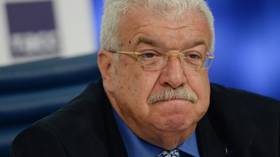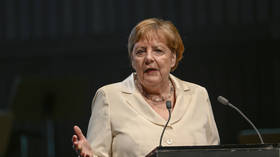ROAR: The “strange story” of Russian spies in Ukraine

A spy row between Moscow and Kiev may influence the Ukrainian presidential election, observers say.
Ukraine’s security service the SBU has revealed it uncovered a spy network and expelled four Russian officers from the country and detained another. According to SBU head Valentin Nalivaychenko, the group was trying to obtain “state secrets” in southern Ukraine and was intercepted on January 27. The alleged spies were caught possessing espionage equipment, he said.
“The network” included officers from Russia’s Federal Security Service (FSB) and a Russian soldier stationed in Moldova’s breakaway Transdniester Republic, Nalivaychenko said. The FSB has confirmed that its officer had been detained in Ukraine. The operation was a response to attempts by Ukraine’s security services to recruit spies from among Russians, it added.
The Russian security service linked the incident in Ukraine to the case of Ukrainian citizen Ruslan Pilipenko. He was detained by Russian military personnel at a Russian military facility on October 29, 2009, in Tiraspol, the capital of the Transdniester Republic.
Pilipenko allegedly pledged to submit information on other spying activities and agents, the FSB said. The meeting with officers that took place in Ukraine’s Odessa Region on January 27 was proposed by this “double agent,” the media say.
Such situations are usually not made public and are solved between secret services, the FSB said. However, Kiev has decided to make the information public days before the second round of the presidential election due to be held on February 7.
This scandal may “heat anti-Russian sentiments among part of the electorate in Ukraine,” Gazeta.ru website said. SBU head Nalivaychenko is considered President Viktor Yushchenko’s close ally, it added. Yushchenko finished fifth in the first round with less than six percent of the vote.
Analysts were not surprised at the eruption of a spy row between the two countries. “All this is too predictable, taking into account the second round of the election in Ukraine,” said Aleksey Vlasov, general director of the Information and Analytical Center at Moscow State University.
During his campaign, leader of the Party of Regions Viktor Yanukovich has repeatedly promised to establish closer relations with Moscow, Vlasov told Gazeta daily. “So, he is not interested in this spy scandal,” the analyst added. Nevertheless, Prime Minister Yulia Timoshenko might “play this card,” he added.
However, Vlasov warned against hasty conclusions, the paper said. It is unclear if Timoshenko will comment on this within the next few days, he said. “Only then it would be possible to say what has actually happened and who is behind this story,” he added.
The incident was no surprise to the Ukrainian president, believes Fedor Lukyanov, editor-in-chief of Russia in global affairs magazine. “The head of the SBU reports to the president,” he told Gazeta.
It is important for Yushchenko, who is leaving his office soon, “to have it his own way to the end, trying to show Russia as Ukraine’s enemy,” Lukyanov said. “He is already preparing for possible early parliamentary elections, and he needs an influential national-democratic faction,” he added.
On the other hand, if the case of collision between the two rivals after the February 7 polls, as in 2004, electing the president may become a prolonged process, and Yushchenko will be able to keep the president’s post for some time, the analyst said.
“It is not very likely, but in any case the more factors of tension, including those linked to Russia, the more chances are for this scenario to be fulfilled,” Lukyanov said.
The row may suit Timoshenko, “who is still considered by many as the anti-Russian candidate,” although this story will unlikely to influence the results of the election, he stressed.
Russia has become one of the main topics of the current electoral campaign, said Konstantin Aksenov of St. Petersburg University. Both Timoshenko and Yanukovich may benefit from the row, he told BaltInfo news agency.
“The mobilization of the anti-Russian electorate requires certain efforts,” Aksenov said, adding that the SBU has fulfilled its task. At the same time, the pro-Russian electorate may become “stirred” too, he noted.
The Ukrainian authorities do not seem to have reached “the apotheosis of stupidity,” said political analyst and TV anchor Maksim Shevchenko. “Only in Ukraine can spies stroll with bags full of spy equipment and, what is most important, with secret instructions on their mobile telephones,” he told the agency. “Sometimes they are caught,” Shevchenko said, adding that one can congratulate the Ukrainian security service “on such achievements.”
However, this scandal is not necessarily linked to the “electoral fuss” in Ukraine, Shevchenko believes. He said that it could have been the work of Moldovan special services. They do not want the Transdniester region to be recognized as a state, and they “could have involved both Ukraine and Russia in the story,” he said.
The “Moldovan version” is possible, agreed Vladimir Kornilov from the Institute of the Countries of the Commonwealth of the Independent States, but the attempt to influence the Ukrainian election was more likely, he told the agency.
“This story just doesn’t hang together, the Ukrainian mass media treat the case differently,” Kornilov said. “People were accused of espionage and immediately released and, at the same time, nothing but a verbal statement from the SBU head followed,” he said. The case does not have “a military implication, only a political one,” Kornilov added.
“Everything is strange in this story,” Argumenty i Fakty weekly said. “It is strange that the intelligence agents, albeit not the worst in the world, have been caught while doing such clumsy work; that some technological secrets have been found in Ukraine, which has not produced anything; that this story has been published by mass media; and that the FSB has reacted to this, and perhaps for the first time in its history has recognized the fact of the detention of its officers.”
“Security services are a special caste,” which, as a rule, catch spies and expel them secretly, the weekly said. However, this time the stakes in the game seem to be too serious because of the presidential election, it added.
“Analysts think that almost no military or state secrets have remained in Ukraine, so the activities of SBU may be aimed at distracting society’s attention from really important problems,” the paper said.
The military-industrial complex of Ukraine is “destroyed,” and it is “senseless to seek any valuable information in this sphere,” said Vladimir Zharikhin, deputy director of the Institute of the CIS countries. He also did not rule out that the Ukrainian authorities wanted to distract attention of people from the arrival of “Georgian observers with military bearing” to Ukraine.
According to a special treaty, “the secret services of the CIS do not work against each other,” Zharikhin told Vzglyad. If the SBU’s statements are ungrounded, that means that Kiev has broken this agreement, he stressed.
“There are many uncertainties in this case,” Zharikhin said. “It is not clear why some people were released, while one was detained. They had to take either all of them, or nobody.”
“However, the SBU does not trouble about producing evidence,” Zharikhin said. “For example, employees of our institute are not allowed into Ukraine and are not explained why,” he said. “This is a big state secret of Ukraine,” the analyst said. “Now the question why the FSB officer was detained will also be a Ukrainian state secret,” he stressed.
Sergey Borisov, RT














